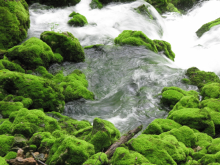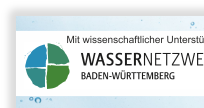 In order to protect water as a resource, it is essential to be able to reliably characterize and analyze the range of substances found in the environment (from pollutants to environmental tracers) and have in-depth knowledge of the sources, transport routes, reaction processes, and sinks. Knowledge of these substances alone is not enough, though. It is also necessary to understand their relevance and their long-term impacts on the environment. Not least, the influence of political and economic decisions on water and material flows is a topic which requires a lot of research.
In order to protect water as a resource, it is essential to be able to reliably characterize and analyze the range of substances found in the environment (from pollutants to environmental tracers) and have in-depth knowledge of the sources, transport routes, reaction processes, and sinks. Knowledge of these substances alone is not enough, though. It is also necessary to understand their relevance and their long-term impacts on the environment. Not least, the influence of political and economic decisions on water and material flows is a topic which requires a lot of research.
Current activities and joint projects in Baden-Württemberg (examples)
| Challenges of Reservoir Management – Meeting Environmental and Social Requirements (CHARM) joint project of the University of Stuttgart (coordination, speaker: Prof. Dr. Silke Wieprecht), the University of Konstanz and the University of Freiburg within the Water Research Funding Programme of the Land of Baden-Württemberg; duration: 2016 - 2020 |
| Effect Network in Water Research (Effect-Net) joint project of the University of Heidelberg (coordination, speaker: Prof. Dr. Thomas Braunbeck), the University of Tübingen and the KIT within the Water Research Funding Programme of the Land of Baden-Württemberg; duration: 2016 - 2020 |
| Catchments as Reactors: Metabolism of Pollutants on the Landscape Scale (CAMPOS) DFG Collaborative Research Centre (CRC 1253) of the University of Tübingen (speaker: Prof. Dr. Peter Grathwohl) with participation of the University of Hohenheim and the University of Stuttgart as well as the Helmholtz Zentrum München - Deutsches Forschungszentrum für Gesundheit und Umwelt and the Helmholtz Centre for Environmental Research (UFZ); funding since 2017 |
| Interface-Driven Multi-Field Processes in Porous Media – Flow, Transport and Deformation DFG Collaborative Research Centre (CRC 1313) of the University of Stuttgart (speaker: Prof. Dr. Rainer Helmig) with participation of the Forschungszentrum Jülich; funding since 2018 |
| Integrated Hydrosystem Modelling DFG Research Training Group (RTG 1829) of the University of Tübingen (speaker: Prof. Dr. Olaf Cirpka) with participation of the University of Hohenheim and the University of Stuttgart, cooperation with Canadian universities (Ontario); funding since 2012 |
| From Catchments as Organised Systems to Models Based on Dynamic Functional Units (CAOS) DFG Research Unit (FOR 1598), coordination: KIT (speaker: Prof. Dr. Erwin Zehe), participation of the University of Freiburg and the University of Hohenheim as well as further research institutions outside of Baden-Württemberg; funding since 2011 |

